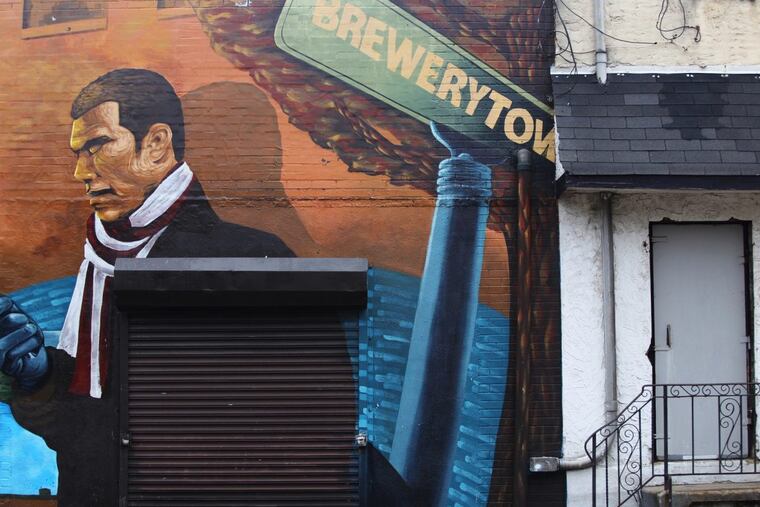A date with one of the controversial Brewerytown letter writers
We have to stop elevating click-bait to debate.

You may have seen the paper and website the other day when we shared letters from white people who were allowed a platform to say black people ruin neighborhoods.
For a minute, I wondered if someone had mined the trash heap that is my inbox.
In fact, I regularly hear from at least two of the letter writers, including Dale Porter, a grandmother from South Philly, who had most recently written me to angrily say that I was more hateful, divisive, and racist than President Trump, whom she had voted for.
This time, the 71-year-old widow of a Philadelphia firefighter was responding to a Brewerytown resident's opinion that the white people moving into her neighborhood were looking down their noses at longtime black residents.
She wrote:
"Regarding the letter about whites moving into Brewerytown, blacks have been doing this in white neighborhoods for years and, for the most part, ruining those areas."
Her letter was just slightly more pointed than that of another letter writer — Vito from Blackwood — who suggested blacks were drug-dealing gang-bangers.
"Is that not true?" Porter asked me as I sat with her the other day, in the same polite tone she had used when offering me a cup of coffee. I thought it would be good to sit down with her, to see what was behind her thinking.
If someone had looked through her window, they might have assumed that we were discussing the weather or the upcoming Fourth of July holiday, for which she had decked out her front porch.
But inside, I was struggling to reconcile this woman's kindly exterior with what was coming from inside her, the talk about the "changing" neighborhoods, the audacity of black and brown kids trick-or-treating on her street.
"I just don't understand. Don't they have their own neighborhoods to go around?" she asked, and explained why she has stopped giving out candy on Halloween.
They're kids, I pointed out. They're not sticking you up, they're just asking for candy.
But no matter how many lifelines I offered Porter, she just threw them right back at me.
Second thoughts about saying most blacks ruin neighborhoods? Never. Worried that she was stereotyping a whole group of people she admitted she's had little interaction with? Nah. Afraid of being labeled a racist? She was good with that, too.
Later, she wondered if it is possible to be "half-racist," since she didn't say all blacks ruin neighborhoods.
As possible as being half-pregnant.
Porter was angry that the Inquirer had run a delayed explanation about the letters for readers who found them as offensive as I had. She complained that the editors hadn't felt the need to explain the first letter, in which a Brewerytown resident had contended that whites moving in were staring down their noses at the longtime black residents.
"Now it's just OK to be reverse racist," she observed.
I asked if she had ever given consideration that a neighborhood's success or failure has less to do with the color of skin of the people who lived in it and more to do with deep-seated poverty, lack of educational and employment opportunities, and overwhelming negligence from developmental and government agencies.
She wasn't buying it.
I knew I'd regret it, but we waded into our country's discriminatory history. She was excited to talk about the disrespect people were showing the Confederate statues and flag. The history of slavery they represent? Not so much.
"C'mon, enough with slavery," she scoffed. "I don't know that all of them weren't well-treated, they had homes, they had food and clothes. … It's all you hear, 'They've been oppressed.' "
I have to admit, this is about the time I knew we were done. I'm hardly a newcomer to people spouting views like this, in my inbox or to my face. Around this time last year, Bill O'Reilly made headlines when he said slaves building the White House were "well-fed and had decent lodgings provided by the government."
But after an hour or so of talking in circles, we found little common ground other than maybe her love for all things pineapples, which she had plastered her living room with.
I realized that people on my side – and make no mistakes, everyone has chosen a side — are approaching this fight for our nation's conscience all wrong.
We keep trying to convince ourselves that this divide is about politics, when really, it's about who and what we value.
We keep telling ourselves that people with racist views are outliers, that they aren't our mothers, our grandmothers, our pleasant-enough co-worker and neighbor down the street. But that's as tone-deaf as that belief we held onto that there was no way Trump would win, that there is no way he'll remain president.
We keep thinking there is a way to find common ground, when I'm not convinced there is a bridge big enough to close that gap. We are so desperate not to be accused of being closed-minded, unwilling to even entertain the "other" side that we are going overboard to empower and elevate click-bait to debate.
We have to stop.
And no, this isn't up for debate.